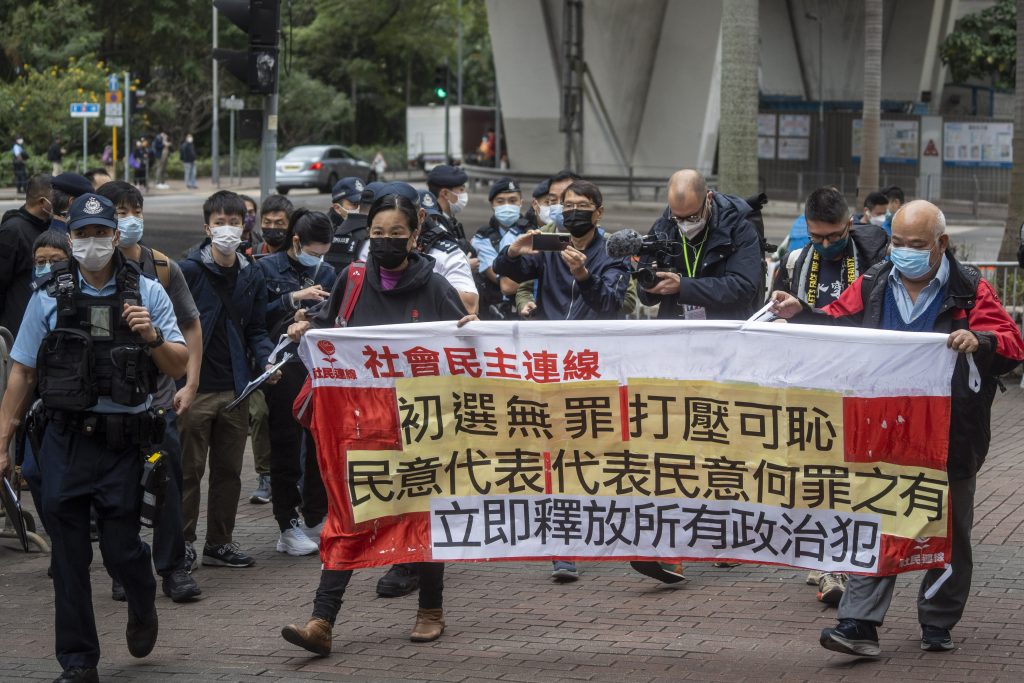Once known for its vibrant civil society and political rights, Hong Kong moved toward illiberal authoritarianism in 2023. This trend began with the introduction of the National Security Law by the Chinese government in 2020, which has led to the arrest of at least 284 people.
Electoral changes have also contributed to the decline of democracy in Hong Kong. In 2023, 47 democrats were trialled for holding an unofficial primary for the Legislative Council election in 2020. Many of these detainees have been in custody since January 2021. The government asserted that the democrats’ plan to gain a majority in the legislature and veto government bills was part of a conspiracy to commit subversion under the national security legislation.
These cases have highlighted the paradoxical nature of elections in Hong Kong, where the government can remain unelected but alternate political parties can only aim for opposition status, not electoral success. This episode has also revealed the fundamental opposition of the Chinese and Hong Kong governments to basic principles of electoral democracy.
In 2023, the Hong Kong government enacted perhaps the most drastic changes to the District Councils. Originally consultative units meant to represent public opinion, District Councils were almost entirely elected through a popular vote until 2019. But in 2023, the government slashed directly elected seats from 452 out of 479 to 88 out of 470. This was supposedly done to improve local governance and bring about greater ‘stability’.
Candidates must now gain nominations from three committees in each district and be approved by the District Council Eligibility Review Committee to run for government, which is meant to ensure that only so-called patriots can run in elections.
These electoral changes have fundamentally reduced the influence of ordinary citizens at the district level. These reforms follow the 2019 District Council elections, which had a record voter turnout of 71 per cent and resulted in a landslide victory for pan-democrats due to widespread discontent during the anti-extradition bill movement.
Due to these reforms, the pan-democratic camp did not register a single candidate in the December 2023 elections because they failed to get nominations. The election had a record low turnout for any post-1997 election, with just 27.5 per cent of Hong Kongers voting — despite the government’s attempt to promote the election with a massive ad campaign.
The 2023 election resulted in an unsurprising victory for major pro-Beijing parties. Importantly, 90 per cent of elected candidates also sat on the committees that decided who was allowed to compete. During the elections, six people were arrested for calling on people to cast blank ballots or interfering with the electoral process.
The election was also marred by a computer system malfunction, which justified a 90 minute extension of the voting window. Despite this, the Chinese government declared that the election showed that Hong Kong is a ‘real, functioning democracy’.
The case of Jimmy Lai in late 2023 drew attention to the erosion of civil liberties in Hong Kong. The former owner of pro-democracy outlet Apple Daily was charged with sedition and ‘collusion with foreign forces’ under the National Security Law.
While he pleaded not guilty, Lai’s newspaper closed in June 2021 after police forces raided its offices and froze its funds. Hong Kong’s media freedom ranking dropped from 80th to 148th in 2022 before recovering slightly to 140th out of 180 countries and territories in 2023.
In 2023, the government also extended its reach over activists who had fled abroad. A reward of HK$1 million (US$128,000) was issued for the arrest of eight dissidents living overseas in July and an additional five in December. This move was intended to reduce their willingness to engage in political activism overseas and also discouraging domestic activists from voicing their opinions.
Academic freedom was also dealt a serious blow when the government refused to give a working visa to Associate Professor Rowena He, forcing her employer, the Chinese University of Hong Kong, to terminate her employment. The scholar previously published on the Chinese democracy movement in 1989, which has since been widely censored in Hong Kong. This was part of a broader government effort to exert greater political influence over Hong Kong’s universities.
Hong Kong Chief Executive John Lee announced plans to introduce Hong Kong’s own national security law, which would be mandated by the Basic Law. The main question will be whether this new law will go beyond the current vague legislation or have an even wider scope. Calls to target ‘soft resistance’ have raised concerns about the potential for further repression.
While 2023 marked a rise in authoritarianism, there were also some positive developments. The government resisted attempts to declare the 2023 Gay Games a threat to national security. The final appeal court also decided that homosexual couples could get equal access to housing. In July 2023, it also rejected the government’s attempt to ban the protest anthem ‘Glory to Hong Kong’, which could have resulted in a massive increase in internet restrictions.
Despite these positive signals, 2023 painted a disheartening picture of the continued autocratisation in the region. The erosion of democratic values, the tightening grip of the national security law and the curtailment of personal freedoms indicate a continuous process towards illiberal authoritarianism.
Stephan Ortmann is Assistant Professor of Politics and Public Administration at Hong Kong Metropolitan University.
This article is part of an EAF special feature series on 2023 in review and the year ahead.


In 2023, Hong Kong experienced an increase in authoritarianism, stemming from changes to electoral systems, the continued application of the National Security Law introduced in 2020 and restrictions on civil liberties. Though there were some positive developments such as the rejection of anti-LGBTQ+ measures, the overall picture was of a drastic shift towards autocracy, contributing to a decline in democratic values, greater persecution of political dissidents overseas and widespread restriction of personal freedoms.